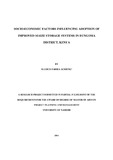| dc.description.abstract | Post-harvest facilities or appropriate storage technology has been the major problem of Kenyan agricultural sector and has resulted in inconsiderable waste of agricultural output and great loss to the economy. The purpose of this study was to determine socio-economic factors influencing adoption of improved maize storage systems in Bungoma District. The specific objectives of the study were: to establish the extent to which education of farmers influences adoption of improved maize storage systems, determine role of training of farmers in influencing adoption of improved maize storage systems, examine how cultural factors influence adoption of improved maize storage systems, and determine how economic status of farmers influence adoption of
improved maize storage systems in the district. The target population of the study was 60,000 small scale farmers undertaking maize farming in Bungoma District from which a sample size of 204 was drawn and involved in the survey. The study utilized multistage cluster sampling technique by use of administrative clusters and thereafter simple random sampling to interview farmers by use of questionnaires. Pilot testing was done in Kakamega District to assess validity and test retest method to ensure reliability. Data obtained from close ended questions was analyzed using quantitative techniques such as frequencies and percentage counts and presented using frequencies and percentage tables with the aid of SPSS (Statistical Packages for Social
Scientists). Qualitative data was transcribed, organized into various emerging themes and reported narratively. The study findings revealed that education strongly influenced adoption of IMSS. Although most people had knowledge on IMSS, there was still low adoption, with 62% of farmers who had knowledge not adopting. The results show that training influences adoption of IMSS in that majority who had received training had adopted, of whom 81% indicated it was beneficial to them. Farmers’ beliefs and attitude influenced adoption of IMSS, with over 50% indicating beliefs hindered them from adoption. About 51% of farmers who got income from farming reported adoption while 13% stated income was too little to adopt. The study thus recommended that, there needs to be a greater focus on awareness creation of IMSS to farmers,
more training needs to be offered to maize farmers to improve their technical know-how, more advocacy initiatives should be put in place to subsidize costs of agricultural products, farmers should form support groups to access financial services to support them in adopting newer,
improved methods. Areas for further research are suggested on: access to financial services by farmers in Bungoma District and its role in adoption of newer storage technologies, the role of newer storage technologies on food security and income in Bungoma District. | en_US |

